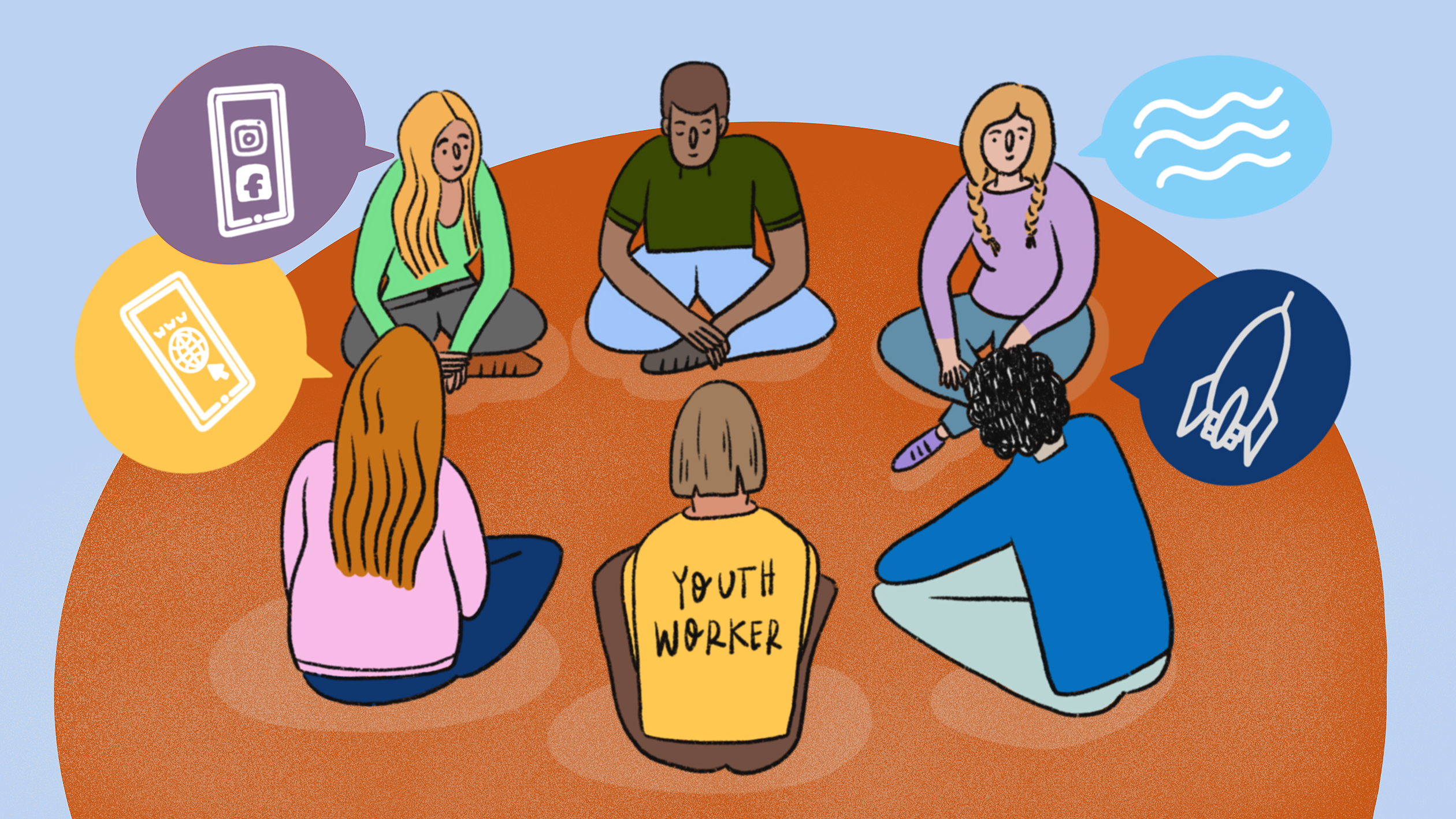
Illustration by Daniela Nunes
Talking about war with young people
by Ewa Dziemidowicz and Marta Wojtas (Empowering Children Foundation – Poland)
Unfortunately, wars have always been fought in different parts of the world, spreading violence, fear and suffering to many people. War has always been associated with anxiety and a sense of danger. It is much easier to deal with such feelings when you talk about them.
Talking helps to process difficult emotions and concerns, it allows you to name and express your emotions. It often brings relief and reduces tension. Joining young people in conversation and listening to them is an important form of support. So, how do we talk about war with young people?
 Start with yourself
Start with yourself
When working with young people, we need to be aware that current events in the world affect their well-being, cause reactions, influence their mood and inspire them to ask questions and search for answers. Young people respond to what is happening in the world – to macro changes, such as a pandemic or war, and to micro changes – in their immediate environment, such as their family, peers, school. The topic of the war in Ukraine is important for many young people. We need to be prepared to discuss this subject and be aware that talking about war is not a one-time event, but an ongoing dialogue. First of all, it is good to stop for a moment and think about how we, ourselves, feel about war. Do we feel helplessness, anger, sadness, despair, fear, indifference? We need to process those emotions first. What exactly triggers these feelings in us? Are these feelings accompanied by any sensations in our bodies such as heaviness in the chest, difficulty in breathing, a feeling of weakness? How do we react to the prospect of talking about war – do we have any concerns about the topic or reactions that young people may experience? What do we need in order to be able to talk about it? In order to intervene meaningfully and hold space for difficult topics such as war, it is essential that we are able to manage our own emotional responses and feelings.
 Be honest and proactive
Be honest and proactive
It is not worth pretending that nothing is happening or avoiding the topic. Being truthful about the causes, impact and consequences of war helps young people understand the situation better and have more informed opinions. Young people are often well aware of what is going on in the world and can be very knowledgeable. If they feel they are being misled or not given a full picture, it can affect their trust in adults and result in them not seeking support when experiencing confusion or distress. Moreover, it is good to build the conversation on what they have already learned about the war. Ask them about what they know and what they understand and about the questions they have, and listen more than you speak. Make space for whatever they are feeling – concern, curiosity, fear, rage, sadness, etc. Do not assume that if the child is not asking questions or talking about war, they are not thinking about it. If you are unsure what the young person is experiencing in relation to this topic – be creative. Start by talking about experiences other than their personal ones – find out what they know about war and what is their greatest fear or concern, whether this is a topic that is addressed in school or on social media they follow.
 The do’s and the don’ts
The do’s and the don’ts
In many cultures, there is a tendency to support feelings of strength and power more than feelings of hurt, fear or sadness, as those are equated with weakness. Moreover, when faced with such feelings in children or youth we often want to make them feel better instantly and, as a result, marginalise what they are experiencing. However, grief, sadness, anxiety and other big feelings need time and safe space to be heard and held. Telling young people to be strong or not think about it is not very useful. Feelings are valuable and relevant whatever they are – when we talk about feelings, make space for them and show how they can be expressed, we are modelling awareness and redefining strength as the ability to support and honour whatever we feel in any given moment.
Don’t say: you are overreacting, it does not concern you, just don’t think about it, think positive, get a grip, everything is fine, etc.
Do say: tell me more about what you feel, let’s talk about it, let me see if I got it right, is there anything you need? I’m here for you, I hear you. I would like to hear about your day/mood/experience, I may not understand everything but I want to support you in any way you need, I can see how hard it is for you, I want to hear what’s in your head, I am here to help, I know how to do that, it’s OK to feel angry/sad/frustrated/anxious, thank you for sharing this with me.
 Find out what they know and from where
Find out what they know and from where
A lot of information comes to young people from the media, but also from peers or other people. It is important to ensure that this information comes from reliable sources. Young people get a lot of information about the war from the internet, where we can find fake news and other not entirely truthful information. These can be misleading and can unnecessarily generate emotions in the audience. It is therefore good to rely on up-to-date information from reliable sources. It is good to communicate it objectively without our judgements and to base the conversation on what we are sure of as well as discuss how to distinguish reliable sources from misinformation. Talk with youth about monitoring media exposure. Constant access to images and videos of violence can be very depressing. Teach them to notice how information about war that they are watching or reading affects their mood and well-being so that they can make a conscious decision about following certain channels and media outlets.
 Putting language to inner experience and emotions
Putting language to inner experience and emotions
When talking about war, we cannot avoid the subject of the emotions that accompany it. When we hear reports of military attacks, refugees or people who are injured or killed, it is natural to feel afraid. Fear is an important emotion in the spectrum of human experience and comes up quite frequently with children and youth. Interestingly, it is also very important; it has a protective function. When we are afraid, we are more likely to decide not to do something that would be really dangerous for us, for example we would not approach a lion when he is free in the wild. On the contrary, because of fear, we quickly take action to save ourselves from danger, for example we run away. It is important for children and young people to understand the purpose of fear. Sometimes, however, there is too much fear and, under its influence, we begin to fear the future and see the world in dark colours. Anxiety can distract our contact with reality and can make it difficult to function in our daily lives. Under its influence, we may withdraw from relationships, different activities, lose motivation and the will to act. In the face of an ongoing war, we may also feel helpless, as we have no influence over what is happening on the frontline. When an armed conflict lasts for a long time, the feeling of helplessness can intensify. The war is nearby, so we can all feel uncertainty. We do not know when the conflict will end, and it is difficult to predict what that end will look like. We may wonder if we are safe in the face of what is happening in Ukraine. Finally, we may also feel anger. Anger is a normal reaction to the evil that is taking place. Our aim is to help children and young people track and express different feelings as they arise.
 Emotions and the body
Emotions and the body
It is important to remember that the emotions we experience also manifest themselves in our body. Our psyche and body are interconnected. When we are afraid, our heart beats faster, our breathing becomes shallower, we feel agitated and ready for action. We need to show children and young people what they can do when that happens. Here are a couple of examples:
- Take a deep breath and look around you. Name five things you can see. Take another deep breath and this time notice five things you can touch. Take a deep breath – notice five things you can smell. Repeat – notice if you are hearing any noise. Repeat again – notice if there is anything that you would like to taste.
- Slow down your breathing. Breath in. Hold it in. Exhale. Pause. Repeat four times.
- Close your eyes and take a deep breath. Scan your body from head to toes – what are you feeling? Is there tension anywhere?
It helps if the young person identifies five or six activities that can help them self-regulate. Explain to children that if they are experiencing anxiety, fear, sadness or anger not expressing them can cause various symptoms such as stomach ache or headache. If anyone notices such symptoms in themselves, it would be a good idea to let a trusted adult know about it.
 Frequent check-ins
Frequent check-ins
Make regular check-ins a part of your time with children and youth. Some of them may find it difficult to express what they are experiencing in words. They may worry “in silence”. Look for different ways of asking them about their mood or the emotions that arise, also in regard to war, for example on a scale from 1 to 13 what is your mood today? If your mood was an object what would it be? What animal would make you feel better now? How would it accomplish it? Play with words and be creative. Encourage young people to express what they are feeling in different ways, for example through drawing, movement, music or other activities.
 Adapting the conversation to the age of your interlocutor
Adapting the conversation to the age of your interlocutor
The person you are talking to may be of varying degrees of maturity to receive difficult content. Therefore, remember to adapt the content to the age of your interlocutor. With children, it is useful to say only what is necessary to understand the situation. When talking to teenagers, we can also consider a more detailed description of what is happening.
 Give a choice
Give a choice
When a young person does not want to talk about the war, they may not be ready for such a conversation. Then you should respect this state and observe what happens. Occasionally ask if he or she wants to talk and reassure them that you are close, and open for a discussion.
 Encourage a sense of agency
Encourage a sense of agency
Children’s fears are soothed by grown-ups’ agency. When one is experiencing strong emotions, it is good to talk to someone one trusts, but there are also a number of actions you can take to help you cope. It helps to focus on resilience and to empower through supporting those that need support. Together with youth look for ways of getting involved. There are many things that can be done – helping victims of war, refugees, volunteering, collecting money or necessary items, etc. Armed conflict is a difficult situation, but also an important lesson in empathy and kindness.
It is, however, worth remembering that not everyone needs to feel the need or willingness to get involved in such activities. Gestures of support cannot be forced, and they may vary. Sometimes a kind smile, support for a colleague who comes from the occupied territories, can suffice. Children can come up with ways of support that feel most authentic to them – for example, placing a flag tag next to your profile picture. Such gestures remind people from occupied areas that they are not alone, that people are thinking about them and supporting them.
 Where to look for help?
Where to look for help?
If your interlocutor is suffering from anxiety or other unpleasant emotions related to the war, it is a good idea to help them find a support system – parents, relatives, friends or refer them to a professional such as a school psychologist or a therapist. If there is no one close by, you can always call the free 24-hour child helpline 116 111, which is the Europe-wide helpline for children and young people and operates in every country. Many of the helplines 116 111 currently also offer help in Ukrainian.
The Empowering Children Foundation is a Polish non-governmental organisation which provides comprehensive services dealing with issues of violence and sexual abuse of children for over 30 years. The ECF team provides children and their caregivers with support, professional psychological and legal assistance and care, supports adults in responding wisely and effectively to violence against children and engages them to raise their children with love and respect. The ECF also influences Polish law so that it protects the best interests of the child.
The ECF has created one of the first manuals dedicated to parents and guardians, as well as teachers, on how to engage in conversation with children about the war in Ukraine.
Link to the manual: Let’s talk about war (in Polish)




